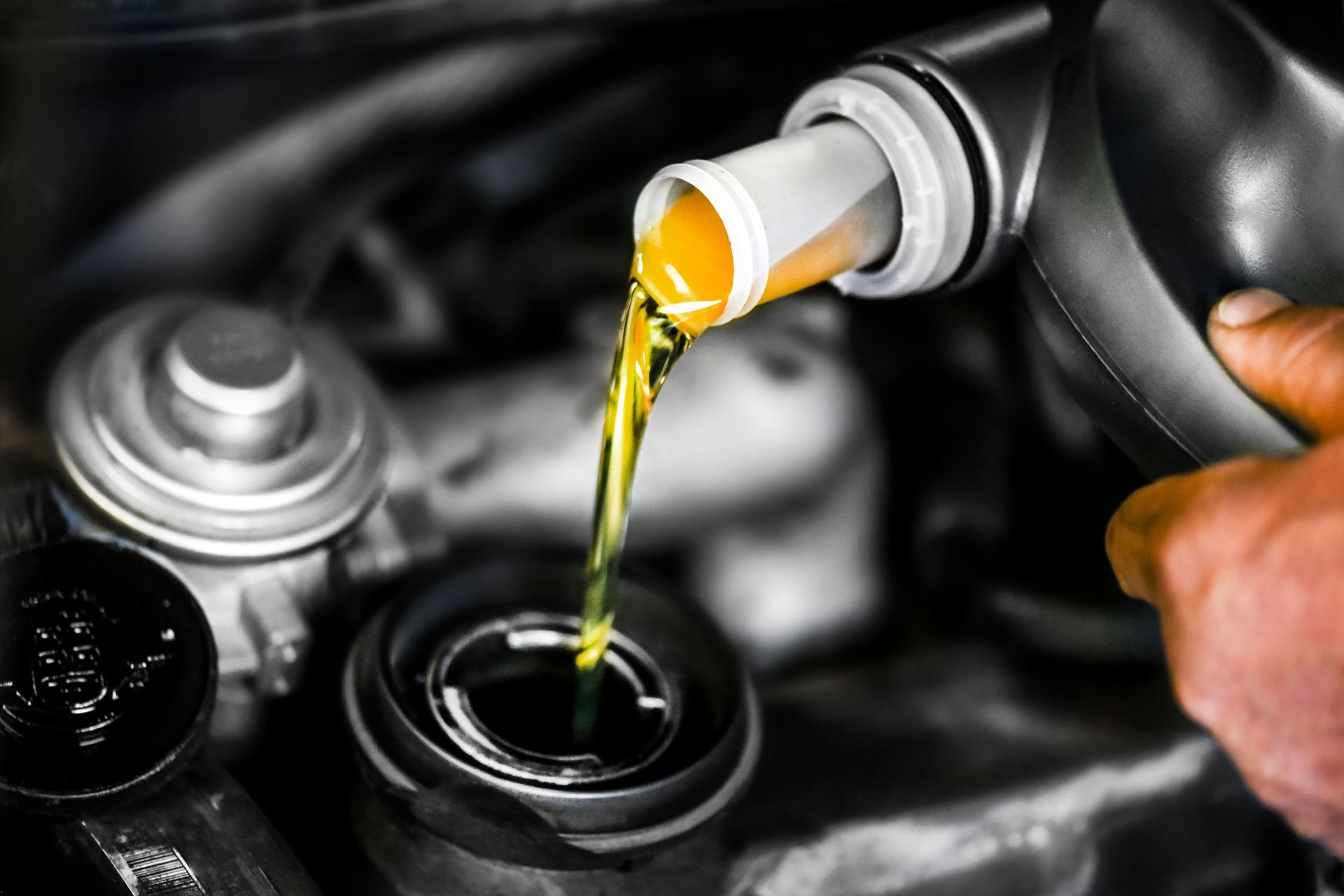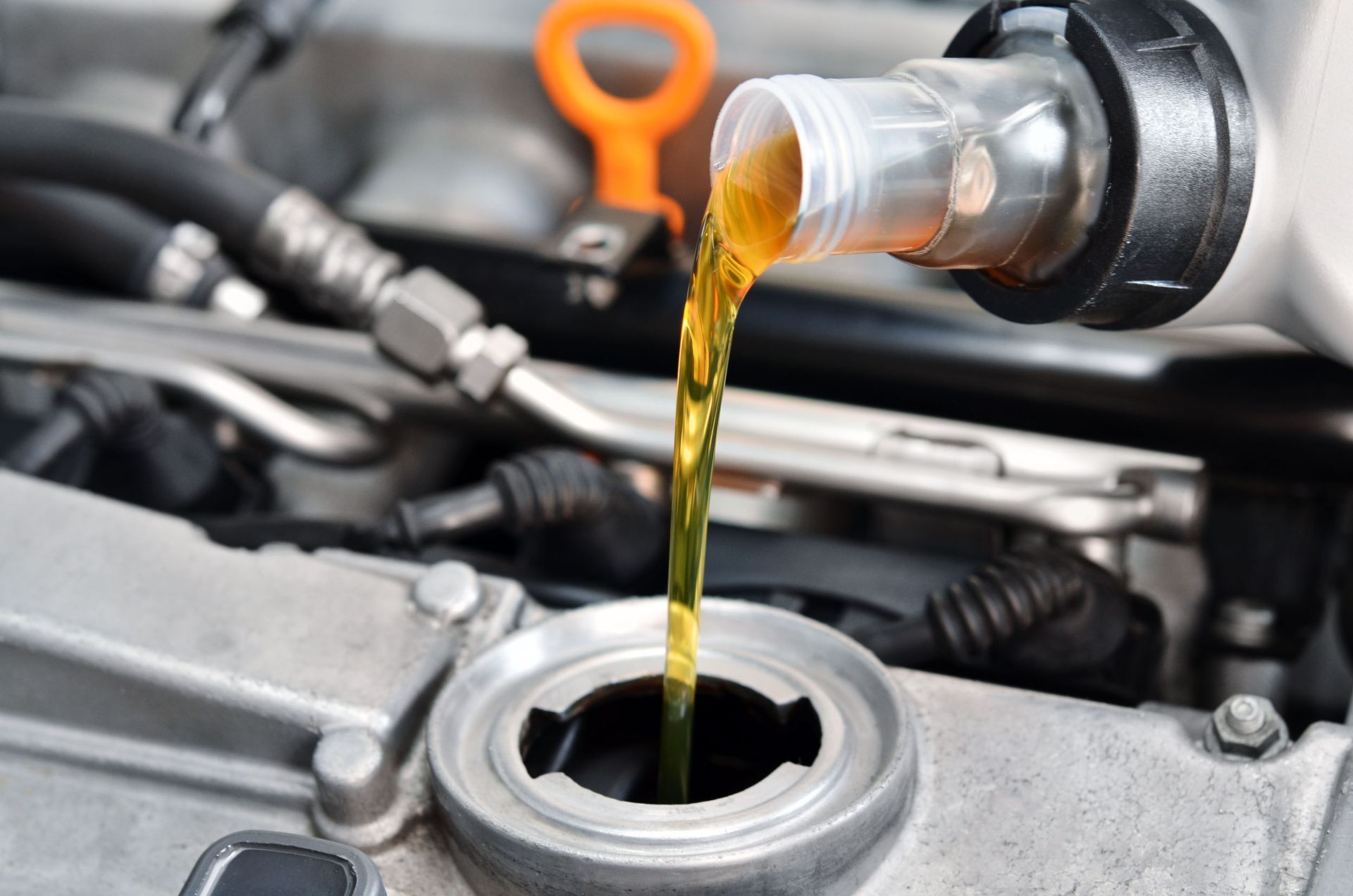November 12, 2025
Choosing the right oil for your car isn't just about keeping the engine running smoothly—it's about protecting your investment for years to come. Every engine is designed with specific lubrication needs in mind, and using the wrong oil can lead to decreased performance, poor fuel efficiency, and even long-term damage. Unfortunately, many drivers rely on guesswork or outdated advice when it comes to oil selection.
The right oil helps manage engine friction, temperature, and wear while supporting optimal performance in every driving condition. From conventional blends to fully synthetic options, understanding what's best for your vehicle requires more than a glance at the label.
In this article, we'll explain how to determine which oil type fits your car, explore the main categories of motor oil, and discuss when to schedule your next local oil change to keep your vehicle in peak condition.
Understand the Purpose of Engine Oil
Motor oil serves several vital functions in your vehicle's engine. It lubricates moving parts, minimizes friction, and prevents metal surfaces from grinding against each other. It also cools engine components, traps debris, and protects against corrosion. Without proper lubrication, engines can overheat or seize entirely, resulting in costly repairs.
The type of oil you choose determines how well your engine performs these functions. Different formulas are designed to handle varying temperatures, driving habits, and vehicle types. The right match helps extend the life of your engine and ensures smoother operation between every local oil change.
Know the Difference Between Oil Types
There are four main categories of motor oil: conventional, synthetic, synthetic blend, and high-mileage. Each offers specific benefits depending on your driving style, vehicle age, and environment.
1. Conventional Oil
Conventional oil is made from refined crude oil and works best for light-duty, low-mileage vehicles. It's affordable and adequate for standard driving conditions, but it breaks down faster under high heat or stress.
2. Synthetic Oil
Synthetic oil is chemically engineered for consistency and superior performance. It resists breakdown, flows better in cold temperatures, and provides excellent protection against wear. According to Reader's Digest, most vehicles will require an oil change after every 5 thousand miles. However, some cars may only need full synthetic oil changes after 7.5 thousand to 10 thousand miles. This durability makes synthetic oil ideal for modern engines, high-performance vehicles, or anyone who drives long distances regularly.
3. Synthetic Blend Oil
As the name suggests, synthetic blend oil combines conventional and synthetic oils. It's a cost-effective option that offers some of the performance benefits of full synthetic oil, making it perfect for drivers who want extra protection without paying a premium.
4. High-Mileage Oil
Designed for vehicles with over 75,000 miles, high-mileage oil contains additives that reduce leaks, minimize oil burn-off, and rejuvenate worn engine seals. If your vehicle is older or you notice small drips under your car, this type may help extend your engine's lifespan.
Check Your Owner's Manual First
One of the simplest yet most overlooked steps in determining the right oil type is reading your owner's manual. Automakers specify which oil viscosity and grade work best for your engine, and these recommendations are based on extensive testing. Using the manufacturer's suggested oil ensures optimal lubrication and performance.
If your manual lists multiple oil options, choose one that best matches your climate and driving habits. For example, those living in colder areas may benefit from oil with lower viscosity ratings, as it flows more easily during cold starts. When in doubt, a professional technician at your next local oil change can help interpret your vehicle's requirements.
Understand Oil Viscosity Ratings
Viscosity refers to how thick or thin an oil is and how it behaves under temperature changes. You'll typically see oil labeled with two numbers, such as 5W-30.
- The first number, followed by the “W,” indicates how the oil flows at cold temperatures (W stands for winter).
- The second number shows how the oil performs when the engine reaches operating temperature.
In general, the lower the first number, the better the oil will flow in cold weather. Thicker oils (with higher second numbers) can handle heat and stress better, which may be beneficial for towing or high-performance vehicles. Understanding these ratings helps you select oil that maintains consistent protection year-round.
Consider Your Driving Conditions
Your environment and driving habits play a huge role in determining which oil suits your vehicle best.
- Frequent short trips: If you often drive short distances, your engine may not reach its optimal temperature, causing moisture and contaminants to build up. Synthetic or synthetic blend oils can help manage these conditions.
- Hot climates: In consistently warm areas, thicker oils perform better by maintaining their protective film under high heat.
- Cold climates: Thin, low-viscosity oils such as 0W-20 are better for cold starts.
- Heavy towing or performance driving: Synthetic oils handle high loads and heat more effectively, reducing wear and extending the life of your engine.
When you visit a local oil change shop, the technicians can evaluate your driving conditions and climate to recommend the most suitable oil type.
Pay Attention to Your Vehicle's Age and Mileage
As engines age, seals wear down, internal clearances increase, and oil consumption may rise. Vehicles with higher mileage often benefit from high-mileage oils formulated with conditioners that rejuvenate seals and reduce leaks.
On the other hand, newer vehicles typically require synthetic oil to meet modern efficiency and emission standards. Many late-model cars feature tight tolerances and advanced turbocharged engines that demand cleaner, more stable lubrication. Following your manufacturer's recommendations is essential for maintaining warranty coverage and optimal performance.
Recognize the Signs You're Using the Wrong Oil
Using the incorrect oil type can result in noticeable changes in your car's performance. Here are some common warning signs:
- Increased engine noise: Thinner oil may not cushion engine components properly.
- Reduced fuel efficiency: The wrong viscosity can cause the engine to work harder.
- Oil leaks or burning smell: Incompatible oil may thin out or break down too quickly.
- Difficulty starting in cold weather: Oil that's too thick can struggle to circulate on startup.
If you experience any of these issues, it's worth scheduling a professional inspection or your next local oil change to verify that you're using the correct oil type for your vehicle.
Learn About Additives and Certifications
Motor oils often include additives that enhance performance, protect against corrosion, and prevent deposits. Common additives include:
- Detergents: Keep internal engine parts clean.
- Dispersants: Prevent sludge formation.
- Anti-wear agents: Protect metal surfaces from friction damage.
- Viscosity index improvers: Help the oil maintain its thickness over varying temperatures.
Additionally, look for certifications from organizations like the American Petroleum Institute (API) or the International Lubricant Standardization and Approval Committee (ILSAC). These labels confirm that the oil meets rigorous industry standards for quality and performance.
Follow the Recommended Oil Change Intervals
Regular oil changes are vital to keeping your engine in good condition. Over time, oil becomes contaminated with dirt, debris, and combustion byproducts, losing its ability to lubricate effectively.
According to Reader's Digest, most vehicles will require an oil change after every 5 thousand miles. However, some cars may only need full synthetic oil changes after 7.5 thousand to 10 thousand miles. While this offers greater convenience, it's still crucial to check your oil regularly between changes.
Ignoring oil change intervals can lead to decreased engine efficiency, increased wear, and even total engine failure. Scheduling consistent maintenance at your trusted local oil change service helps protect your vehicle's longevity.
Selecting the right oil type for your vehicle might seem like a small decision, but it's one that has long-term effects on your car's health, efficiency, and performance. Whether you drive short city trips, commute long distances, or tow heavy loads, understanding the different types of oil and their benefits can help you make a confident choice.
By following your owner's manual, considering your driving habits, and consulting professionals, you'll keep your vehicle running at peak performance. Regular maintenance—especially timely oil changes—protects your investment and extends your car's lifespan.
If you're unsure which oil is right for your engine, don't guess. Visit your trusted local oil change shop today for expert advice and professional service that keeps your vehicle running like new. Visit us at Jersey Shine & Lube today!




